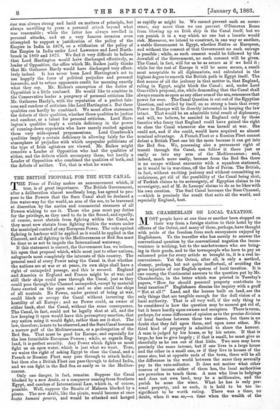THE BRITISH PROPOSAL FOR THE SUEZ CANAL. T HE Times of
Friday makes an announcement which, if true, is of great importance. The British Government, after a deliberation almost needlessly long, has agreed to pro- pose to the Powers that the Suez Canal shall be declared a free water-way for the world, an arm of the sea, to be traversed at discretion by the navies and commercial steamers of all Powers wishing to use it. Those who pass must pay duties for the privilege, as they used to do in the Sound, and equally, of course, must abstain from fighting within the Canal, as they must now abstain from fighting within the waters under the municipal control of any European Power. The rule against fighting in harbour will be applied as it would be applied in the Channel, and all fighting in the Mediterranean or Red Sea must be done so as not to impede the International waterway.
If this statement is correct, the Government has, we believe, hit upon that proposal which, while most just to other nations, safeguards most completely the interests of this country. The general need of every Power using the Canal is, that whether the nations are at war or at peace, its own ships shall have a right of unimpeded passage, and this is secured. England and America or England and France might be at war, and still their ships could pass through the Canal, just as they could pass through the Channel unimpeded, except by material force exerted on the open sea ; and so also could the ships of all neutrals. No Power, under pretext of being at war, could block or occupy the Canal without incurring the hostility of all Europe ; and no Power could, as owner of either bank, shut the Canal, without the same consequence.
The Canal, in fact, could not be legally shut at all, and the law keeping it open would have this peremptory sanction, that any nation using it would fight, rather than see it shut. The law, therefore' is sure to be observed, and the SuezCanal becomes a narrow gulf of the Mediterranean, or a prolongation of the Red Sea. That must be good for Europe, and especially for the less formidable European Powers ; while as regards Eng- land, it is perfect security. Any Power which fights us must fight us on open water, which is just what we want. True, we waive the right of asking Egypt to close the Canal, and a French or Russian Fleet may pass through to attack India ; but then also a British Fleet can pass through to defend India, and we can fight in the Red Sea as easily as in the Mediter- ranean.
Only one danger, in fact, remains. Suppose the Canal blocked by a new Arabi, or a conqueror coming from Southern Egypt, and careless of International Law, which is, of course, possible. Well, Suppose the Straits of idalacca blocked by a pirate. The new Arabi, like the pirate, would become at once hostis humane generis, and would be attacked and hanged as rapidly as might be. We cannot prevent such an occur- rence, any more than we can prevent O'Donovan Roses from blowing up an Irish ship in the Canal itself, but we can punish it in a way which no one but a lunatic would risk. Moreover, we intend to construct, in one way or another, a stable Government in Egypt, whether Native or European, and without the consent of that Government no such outrage is possible ; while, as such consent would be followed by the downfall of the Government, no such consent will be given. . The Canal, in fact, will for us be as secure as if we held it ; while for the rest of Europe it will be more secure, a result most acceptable to all diplomatists, and calculated in the highest degree to smooth the British path in Egypt itself. The first source of all the jealousy in that matter is, that England, ruling in Egypt, might block the Canal ; and, under Lord Granville's proposal, she, while demanding that the Canal shall always remain as open as any other mad the sea, renounces that power for ever. The Canal Question is cut out of the Egyptian Question, and settled by itself, on so strong a basis that every Power in Europe will be directly interested in keeping the law intact. That would be an admirable total result of diplomacy, and will, we believe, be assailed in England only by those fanatics who fancy that England could have gained the right to close the Canal whenever she was herself at war. She could not, and if she could, would have acquired an almost nominal advantage. A French Fleet or a Russian Fleet cannot defeat a British Fleet one bit the more because it can get into the Red Sea. We possessing also a permanent right of transit through the Canal, can follow it there just as ea,sily as into any arm of the Mediterranean ; and, indeed, much more easily, because from the Red Sea there is no escape without encounter with a squadron stationed, as it would be in war-time, off the Isle of Perim. The British, in fact, without exciting jealousy and without committing an unfairness, get rid of the possibility of the Canal being shut, of Turkish claims to its sovereignty, of Egyptian claims to its sovereignty, and of M. de Lesseps' claims to do as he likes with his own creation. The Suel Canal becomes the Suez Channel, —which is precisely the result that suits all the world, and especially England, best.














































 Previous page
Previous page